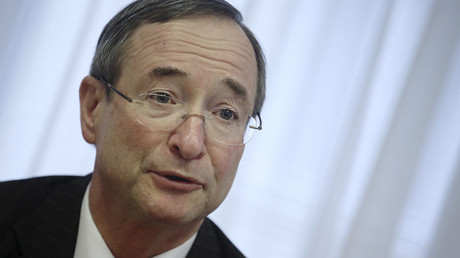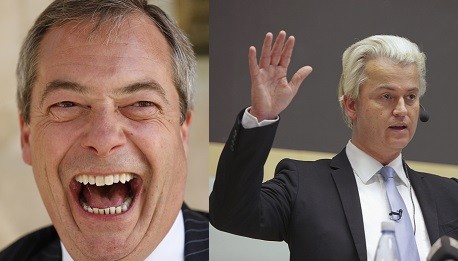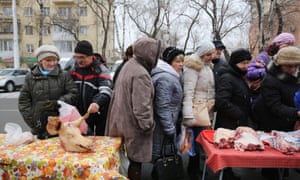In my last blog entry (14 April, 2016) I wrote that,
"Russia has announced it will now form a new paramilitary fighting force, the National Guard, which can effectively be used for non-conventional warfare if need be. This comes as the Russian Federation is heavily involved in ongoing conflicts in both Ukraine and Syria among other countries." (Chris Tomson : AMN : 09/04/2016) (my emphasis)
This National Guard will be directly answerable to Putin himself, and will become a substitute for the current Russian soldiers fighting in eastern Ukraine. This para-military force is indistinguishable from the Russian armed forces, as was the case during the Chechen wars, primarily to make their presence less controversial than his Russian soldiers now active in eastern Ukraine.
 Rather timely, we now have Gorbachev, emerging from the woodwork, describing in an interview that,
Rather timely, we now have Gorbachev, emerging from the woodwork, describing in an interview that,
" .... the Ukrainian crisis [is] “an abscess that sends fever through Europe and the whole world” and has called for an urgent meeting between the Russian and American presidents to secure a peaceful settlement to the issue" (RT : 21 Apr, 2016)(my emphasis)
 This "abscess", as Gorbachev so directly describes Putin's war with Ukraine, is what Nato Secretary-General Jens Stoltenberg (right) precisely pointed out at the first formal meeting of the Nato-Russia Council in almost two years, stating that,
This "abscess", as Gorbachev so directly describes Putin's war with Ukraine, is what Nato Secretary-General Jens Stoltenberg (right) precisely pointed out at the first formal meeting of the Nato-Russia Council in almost two years, stating that,
" .... the two sides "disagree on the facts, the narrative and the responsibilities" on Ukraine."
Furthermore that,
"This is Russia destabilising eastern Ukraine, providing support for the separatists, munitions, funding, equipment and also command and control." (BBC News : 20 April 2016) (my emphasis)
Underscoring what Gorbachev said, Putin's forces are playing a rather dangerous game with NATO forces in the Baltic sea.
"Two Russian planes flew close to a US guided missile destroyer almost a dozen times, American officials have said. ..... The [Russian] aircraft did not respond to safety warnings in English or Russian." (BBC News : 13 April 2016)
These provocations from Putin, when viewed against the recent creation of his private army, the so-called National Guard, could indicate that Putin and his kleptocratic clique are beginning to worry over internal dissent and, more particularly, the looming elections in Russia.
We should all cast our minds back to the Moscow apartment bombings in September 1999, when Putin was the then Prime Minister of Russia, and which Alexander Litvinenko (amongst others) publicly exposed that these bombings,
".. were a false flag attack coordinated by the FSB in order to win public support for a new full-scale war in Chechnya" (Wikipedia)
It is also no co-incidence that during the Chechen war, Putin's public approval rating skyrocketed, and in 2000 he was elected president of Russia for the first time.
Is this the template of actions that Putin is now putting in place to pre-empt any threat to his power?
Is this why he has set up his private army, the National Guard, to create 'false flag' operations in Russia, and to then legitimise any crackdown on the Russian people under the guise of trying to 'weed out terrorists'?
Furthermore, is Putin's new National Guard also being created to draw out his war with Ukraine for a few more years?
As reported by AFP,
 "Ukraine's
defence minister warned Wednesday it may take years to settle the
ex-Soviet republic's pro-Russian separatist conflict that has killed
nearly 9,200 people and plunged Moscow's relations with the West to a
post-Cold War low.
"Ukraine's
defence minister warned Wednesday it may take years to settle the
ex-Soviet republic's pro-Russian separatist conflict that has killed
nearly 9,200 people and plunged Moscow's relations with the West to a
post-Cold War low.
It is therefore no wonder that Poroshenko recently stated that,
"No talks on lifting Western sanctions against Russia should take place until Moscow completely withdraws its military presence from Ukraine, President Petro Poroshenko said on Thursday.


 "The Dutch parliament has defeated a motion calling for the country to
pull out of a treaty establishing closer European Union ties with
Ukraine. " (RFERL : April 19, 2016) (my emphasis)
"The Dutch parliament has defeated a motion calling for the country to
pull out of a treaty establishing closer European Union ties with
Ukraine. " (RFERL : April 19, 2016) (my emphasis)
 "The European Commission has officially proposed visa liberalisation for Ukraine. The revelant document was published
on the website of the institution on April 20. According to it, Kyiv
has satisfied all the requirements needed for visa-free travel for
Ukrainians across Europe." (UT : Apr. 20, 2016) (my emphasis)
"The European Commission has officially proposed visa liberalisation for Ukraine. The revelant document was published
on the website of the institution on April 20. According to it, Kyiv
has satisfied all the requirements needed for visa-free travel for
Ukrainians across Europe." (UT : Apr. 20, 2016) (my emphasis)
 "Russia and Ukraine’s presidents discussed the fate of Ukrainian pilot
Nadiya Savchenko, and the two Russian servicemen captured in Ukraine, in
a phone call on Monday." (
Damien Sharkov
(right): Newsweek : 4/19/16)
"Russia and Ukraine’s presidents discussed the fate of Ukrainian pilot
Nadiya Savchenko, and the two Russian servicemen captured in Ukraine, in
a phone call on Monday." (
Damien Sharkov
(right): Newsweek : 4/19/16)

"Russia has announced it will now form a new paramilitary fighting force, the National Guard, which can effectively be used for non-conventional warfare if need be. This comes as the Russian Federation is heavily involved in ongoing conflicts in both Ukraine and Syria among other countries." (Chris Tomson : AMN : 09/04/2016) (my emphasis)
This National Guard will be directly answerable to Putin himself, and will become a substitute for the current Russian soldiers fighting in eastern Ukraine. This para-military force is indistinguishable from the Russian armed forces, as was the case during the Chechen wars, primarily to make their presence less controversial than his Russian soldiers now active in eastern Ukraine.
 Rather timely, we now have Gorbachev, emerging from the woodwork, describing in an interview that,
Rather timely, we now have Gorbachev, emerging from the woodwork, describing in an interview that," .... the Ukrainian crisis [is] “an abscess that sends fever through Europe and the whole world” and has called for an urgent meeting between the Russian and American presidents to secure a peaceful settlement to the issue" (RT : 21 Apr, 2016)(my emphasis)
" .... the two sides "disagree on the facts, the narrative and the responsibilities" on Ukraine."
Furthermore that,
"This is Russia destabilising eastern Ukraine, providing support for the separatists, munitions, funding, equipment and also command and control." (BBC News : 20 April 2016) (my emphasis)
Underscoring what Gorbachev said, Putin's forces are playing a rather dangerous game with NATO forces in the Baltic sea.
"Two Russian planes flew close to a US guided missile destroyer almost a dozen times, American officials have said. ..... The [Russian] aircraft did not respond to safety warnings in English or Russian." (BBC News : 13 April 2016)
These provocations from Putin, when viewed against the recent creation of his private army, the so-called National Guard, could indicate that Putin and his kleptocratic clique are beginning to worry over internal dissent and, more particularly, the looming elections in Russia.
We should all cast our minds back to the Moscow apartment bombings in September 1999, when Putin was the then Prime Minister of Russia, and which Alexander Litvinenko (amongst others) publicly exposed that these bombings,
".. were a false flag attack coordinated by the FSB in order to win public support for a new full-scale war in Chechnya" (Wikipedia)
It is also no co-incidence that during the Chechen war, Putin's public approval rating skyrocketed, and in 2000 he was elected president of Russia for the first time.
Is this the template of actions that Putin is now putting in place to pre-empt any threat to his power?
Is this why he has set up his private army, the National Guard, to create 'false flag' operations in Russia, and to then legitimise any crackdown on the Russian people under the guise of trying to 'weed out terrorists'?
Furthermore, is Putin's new National Guard also being created to draw out his war with Ukraine for a few more years?
As reported by AFP,
 "Ukraine's
defence minister warned Wednesday it may take years to settle the
ex-Soviet republic's pro-Russian separatist conflict that has killed
nearly 9,200 people and plunged Moscow's relations with the West to a
post-Cold War low.
"Ukraine's
defence minister warned Wednesday it may take years to settle the
ex-Soviet republic's pro-Russian separatist conflict that has killed
nearly 9,200 people and plunged Moscow's relations with the West to a
post-Cold War low.
...
"In
my opinion, it will take years," [Stepan] Poltorak (left) told a small group of
reporters when asked how long it may take to resolve the war." (Yahoo News (AFP) : April 20, 2016) (my emphasis)It is therefore no wonder that Poroshenko recently stated that,
"No talks on lifting Western sanctions against Russia should take place until Moscow completely withdraws its military presence from Ukraine, President Petro Poroshenko said on Thursday.
Any
sanctions relief in return for a partial fulfillment by Russia of the
conditions of the Minsk peace deal "will be a direct threat to solving
the situation in Donbass," the region of eastern Ukraine where
pro-Russian separatists are battling Ukrainian government forces." (Yahoo News (Reuters) : April 21, 2016) (my emphasis)
However, will Putin's 'friends' in the EU be willing to extend EU sanctions against Putin when they come up for renewal in July?


But whilst German industry (right above: Dietrich Moller (Siemens)) and the Austrian president (left above) want EU sanctions
against Russia to be removed, both Canada and the US want sanctions
against Russia to be increased.
Is it this fact that also underlies Gorbachev's plea for an urgent meeting between Putin and Obama to secure a 'peaceful settlement' of the war in Ukraine?
Or is it the fact that,
"Ukraine's newly-appointed representative to the EU, Mykola Tochytskyi,
says he expects Brussels to support the full entry into force of the
association agreement" ( : News: 19 April 2016),
and that,
Added to which,
What these developments show is that Putin's 'maskirovka' strategy to stymie Ukraine's economic integration with the EU has failed, notwithstanding his 'covert' political and propaganda suppport of the Dutch right-wing and left-wing during their referendum electioneering.
Events now seem to be closing in upon Putin.
Not only has he now to let his new National Guard 'watch his back' in Russia itself, his failed attempt to get the Ukraine-EU Trade Pact completely stalled is fast diminishing his options of de-railing the integration of Ukraine into the EU.
And lest we forget,
Is an exchange of prisoners in the offing?
(to be continued)





